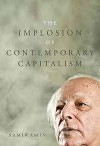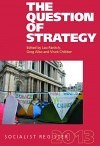Marxism
Eduardo Galeano, who was born in Uruguay in 1940, has written big, thick books. Open Veins of Latin America (1973), which Hugo Chávez of Venezuela handed to Barack Obama in May, hoping it would teach him history, is more than 300 pages. Then there’s Galeano’s Memory of Fire Trilogy: Genesis, Faces & Masks, and Century of the Wind that adds up to nearly 1,000 pages. More recently, he has written shorter books, and practiced a kind of ecology of the word. Mirrors, his newest work, contains more than one hundred short entries about almost everything — from salt to maps and money, and almost everyone, from Cleopatra to Alexander Hamilton and Che Guevara. None of the entries is longer than a single page. Not surprisingly, Galeano’s answers to the questions in this interview are pithy, poetic, humorous, and sometimes oblique. “I’m fighting word inflation, which in Latin America is worse than monetary inflation,” he says. “I try to say more with less — because less is more.” -J.R. | more…

In this slim, insightful volume, noted economist Samir Amin returns to the core of Marxian economic thought: Marx’s theory of value. Amin defends Marx’s theory of value against its critics and also tackles some of its trickier aspects. He examines the relationship between Marx’s abstract concepts—such as “socially necessary labor time”—and how they are manifested in the capitalist marketplace as prices, wages, rents, and so on. He also explains how variations in price are affected by the development of “monopoly-capitalism,” the abandonment of the gold standard, and the deepening of capitalism as a global system. | more…

Renowned political economist Samir Amin, engaged in a unique lifelong effort both to narrate and affect the human condition on a global scale, brings his analysis up to the present—the world of 2013. The key events of our times—financial crisis, the emerging nations, globalization, financialization, political Islam, Euro–zone implosion—are related in a coherent, historically based, account. | more…
One of the main accomplishments of the Israeli government’s bombing and invasion of the Gaza Strip last winter was to inspire new vitality within leftist and peace groups in solidarity with the Palestinian struggle for justice and liberation. This wave of activity has continued after the supposed ceasefire, with demonstrations and direct actions from New York to Los Angeles, Paris, Jaffa, and Tel Aviv. Most noteworthy has been a coming out of sorts of an increasingly large and vocal segment of the Jewish world that is not only opposed to the Israeli government’s wars and military occupations, but critical of Zionism itself. | more…
The previous century now seems to be drawing away from us at an increasing speed, especially in the global society’s existing superabundance of communications. Readers of Monthly Review know that the basics have remained the same in the all too physical world of capitalism and neocolonialism, as much as they might have changed in terms of resistance and apparent alternatives. Still, as the graying of the 1960s generation continues, and the New Deal era draws ever further into a kind of archeology, a summing up of some points is useful and may even be fun. | more…

Is it advisable for one who is not an expert on economic and social issues to express views on the subject of socialism? I believe for a number of reasons that it is.… Clarity about the aims and problems of socialism is of greatest significance in our age of transition. Since, under present circumstances, free and unhindered discussion of these problems has come under a powerful taboo, I consider the foundation of this magazine to be an important public service. | more…

Celia Sánchez is the missing actor of the Cuban Revolution. Although not as well known in the English-speaking world as Fidel Castro and Che Guevara, Sánchez played a pivotal role in launching the revolution and administering the revolutionary state. The product of ten years of original research, One Day in December draws on interviews with Sánchez’s friends, family, and comrades in the rebel army, along with countless letters and documents. This is the extraordinary story of an extraordinary woman who exemplified the very best values of the Cuban Revolution: selfless dedication to the people, courage in the face of grave danger, and the desire to transform society. | more…
Who could have imagined the 2008 presidential campaign?
Commentators, media people, and especially politicians fell all over themselves proclaiming that the 2008 election had, “nothing at all to do with race.” And yet every event, every speech and comment, every debate and appearance had race written all over it. Stephen Colbert, the brilliant satirist, hit it on the head when he asked a Republican operative, “How many euphemisms have you come up with so far so that you won’t have to use the word ‘Black?’” Everyone laughed good-naturedly. | more…
Derek Wall, Babylon and Beyond: The Economics of Anti-Capitalist, Anti-Globalist and Radical Green Movements (London: Pluto Press, 2005), 236 pages, paperback, $26.95.
For decades we’ve been told that “there is no alternative” to global capitalism—that trust in the market was the only way to bring progress and end poverty, despite the clear absence of an actual end to poverty. The global financial crisis of 2008 has undermined the rhetoric of inevitability, as even its most prominent practitioners begin to question the logic of neoliberalism. A Washington Post editorial titled “The End of American Capitalism?” quotes the Nobel Prize–winning former World Bank chief economist Joseph Stiglitz as saying: “People around the world once admired us for our economy, and we told them if you wanted to be like us, here’s what you have to do—hand over power to the market. The point now is that no one has respect for that kind of model anymore given this crisis. And of course it raises questions about our credibility. Everyone feels they are suffering now because of us” (October 10, 2008). | more…
“If we believe in people, if we believe that the goal of a human society must be that of “ensuring overall human development,” our choice is clear: socialism or barbarism.” These concluding lines from “The Path to Human Development” appear on the back cover of one Venezuelan edition—a pocket-sized edition much like the widely circulated “Socialism Does Not Drop from the Sky” (chapter 5 of Build It Now). The other edition, together with an extended edition of that latter essay (including my “New Wings for Socialism” from the April 2006 Monthly Review), is being published as The Logic of Capital versus the Logic of Human Development for the communal council libraries in Venezuela. | more…

Socialist Register 2013 seeks to explore and clarify strategy for the Left in the light of new challenges and new opportunities. Socialists today have to confront two realities: that they cannot avoid the question of reforms and a gradualist path out of capitalism, and that the organizational vehicles for socialism will most likely have to abide by different structures and principles than those that dominated left politics in the 20th century. Though solutions are not obvious, Socialist Register 2013 interrogates these dilemmas and critiques some unhelpful radical thinking that obstructs the reconsideration of socialist strategy for the 21st century. It asks, how have the occupations of public squares around the world changed the political scene? What are the most useful forms of political organization in the new conjuncture? Which features of past organizational models should be retained, and which discarded? | more…
The transition from capitalism to socialism is the most difficult problem of socialist theory and practice. To add to this the question of ecology might therefore be seen as unnecessarily complicating an already intractable issue. I shall argue here, however, that the human relation to nature lies at the heart of the transition to socialism. An ecological perspective is pivotal to our understanding of capitalism’s limits, the failures of the early socialist experiments, and the overall struggle for egalitarian and sustainable human development | more…




